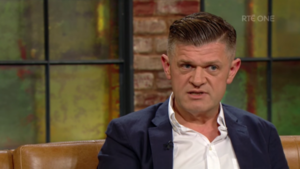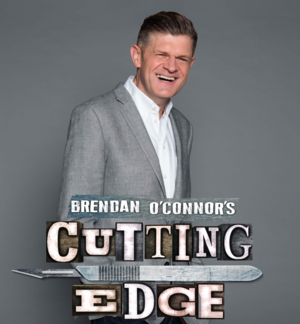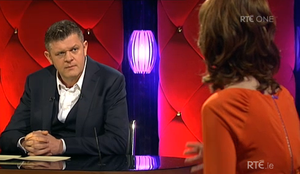Last Friday night, Brendan O’Connor spoke to Ryan Tubridy on the Late Late Show about the level of services for children with a disability in Ireland.
He explained that, under Irish law, every child is supposed to have an assessment of needs within six months but that only a third of children in Ireland are actually getting that assessment within the statutory timeframe.
He also said, at the end of 2015, 15,000 people were waiting for an assessment of needs – up 20% from the year before. He said some have to wait two years.
Further to this…
Diarmaid Twomey writes:
Last Friday night’s appearance by Brendan O’Connor on The Late Late Show has got huge media attention in recent days. During the course of his interview, Brendan, who has a daughter living with Down Syndrome, was at pains to point out the plight of children living with disabilities in Ireland, and the lack of services available to them and their families.
While the portion of the interview dedicated to his experience and insight was extremely powerful, and no doubt resonated with families the length and breadth of Ireland, I couldn’t help feeling that an opportunity had been lost after watching it.
Too often in Ireland, when we are confronted with injustice and inequality, we are content to simply pay lip service to the particular issue, pontificating briefly, before ultimately moving on, without ever trying to understand how we can make changes in order to alleviate the issue.
Unfortunately, Friday night was no different, in my opinion.
Ireland is unique in so many great ways, however, one of the unique aspects of our collective character that has consistently frustrated me is the hypocrisy of our attitude to politics, and our perceived inability to recognise how our interactions with politics affects vulnerable people.
We are experts at decrying the lack of availability of quality services, however, what we rarely seem to highlight is that it is us, the Irish people, that put in place the politicians that preside over the provision of these services.
If we are truly serious about creating a fair society where the children with disabilities that Brendan spoke so passionately about are not left wanting and waiting for services, we need to recognise that it is not the politicians that are the problem, it is us.
We need to embrace our responsibility as citizens of our democracy, and develop a more intellectual response to such negligence.
Twenty minutes exposure to such an issue on primetime television is all well and good, but ultimately it changes nothing. Governments shape policy. Are we voting for policies or personalities at the ballot box?
While the latest general election showed some shift in voting patterns, the resounding victory for the ‘independent’ politicians of Ireland is unlikely to make any difference. The idea of an ‘independent’ politician sounds great in principle, but the reality is quite different.
Disability services in Dublin don’t get votes in Kerry or North Tipperary. After all, it’s no coincidence that drink driving laws for the back roads of Kerry, Casino proposals for Tipperary, and God’s influence on the weather, garnered infinitely more impassioned posturing among our rurally based ‘independent’ TD’s, than the plights of disabled children throughout Ireland.
The shovel of tarmac reigns supreme in the land of the ‘independent’ politician.
Of course, it would be unfair to single out and castigate the people of Kerry and Tipperary in isolation. Ireland re-elected Fine Gael, and in doing so, we have placed Ireland’s childrens’ well-being in the hands of a party that ideologically values tax cuts over investment in public services.
At one point during Friday’s interview, Brendan asked the audience to get behind the new government, ironically omitting the fact that if Brendan, or you, or I, support Fine Gael, then by default we support the idea of lower taxes over increased and adequate supports for disabled children.
That’s not Opposition speak, that is reality, a reality I was surprised was lost on Brendan.
We get the politicians and society we deserve. Unfortunately for vulnerable children and those without a voice, they too live with the consequences of our decisions and ideologies.
But this goes beyond politics. One thing that has always struck me when debates around the need for increased services take hold is the contradictory nature of our aversion to tax rate increases.
During these debates, we often hear comparisons being made with more developed social and health systems in other nations, predominantly the Scandinavian ones. However, we rarely hear about the level of tax they pay to fund their progressive societies.
Since the establishment of our state, elections have been won off the back of promised goodies.
These goodies almost always take the form of tax cuts, and every single time the allure of the extra few bob seems too good to resist. We don’t want the USC tax, so its offered up in exchange for votes.
We decried the increase in VAT, so it’s tinkered with to “boost business”. We marched on the streets against water charges, and the newly elected government capitulate.
Anyone who dares to mention the need for corporations to contribute a bit more, or even just pay the actual rate of 12.5%, is labelled a lunatic and silenced. We seem removed from the reality of the need for substantial taxes in order to have high quality services.
No one likes paying tax, and very few of us seem to trust our politicians with the tax we do pay. But the reality is we are electing the politicians we blame for putting vulnerable children in such dire circumstances and we control the tightening public purse strings.
We are the ones who take to the streets in opposition to the introduction of new taxes, yet feel we show solidarity with vulnerable children by tuning into the Late Late and experiencing anger for twenty minutes.
We can’t have it every which way.
As well intentioned and genuine as the anger is following Brendan’s appearance on The Late Late Show, anger just isn’t enough. Action is what is required. Improved services need more resources to deliver. Increased resources demand larger contributions by all of us.
Sadly, until Ireland develops a social conscience at the ballot box, and accepts the need for higher taxes to care for all of her children, I believe that history is destined to repeat itself.
In years to come, the pages of our history will be littered with the scribbles of impassioned cries for help. Brendan himself eluded to this. Many cries will be noted. Our actions will decide if they are heeded.
Watch Late Late in full here









